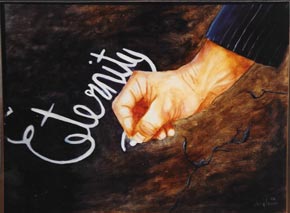Mr. Eternity
By Curtis Peter van Gorder
My daughter once asked me if I regretted devoting my life in service to the Lord.
I answered, “No regrets whatsoever. The idea has been to work with eternity in mind.”
The expression “forever and a day,” the infinity symbol ∞, and the Mobius strip have always fascinated me. I pondered what living just for the moment could do to a man. It often would leave him empty, unfulfilled, and in the end an empty shell. I wanted more out of this life and eternity in the next.
The word “eternity” has been popularized by an amazing guy who passed away in 1967, named Arthur Stace. His life story has been remembered in a book, an opera, and a film.1 Tribute was paid to him in a fireworks display at the end of the 2000 Sydney Olympic Games Opening Ceremony and the Sydney Harbor New Year Celebration.
Raised in an abusive and alcoholic family, involved in petty crime, for the first 45 years of his life, Arthur was a “drunken, good-for-nothing derelict,” as described many years later by his biographer. All of that changed the day he heard a sermon from Isaiah 57:15:
For thus saith the high and lofty One that inhabiteth Eternity, whose name is Holy; I dwell in the high and holy place, with him also that is of a contrite and humble spirit, to revive the spirit of the humble, and to revive the heart of the contrite ones.
John Ridley’s words from that sermon were, “Eternity, Eternity, I wish that I could sound or shout that word to everyone in the streets of Sydney. You’ve got to meet it, where will you spend Eternity?”
Stace later said, “Eternity went ringing through my brain, and suddenly I began crying and felt a powerful call from the Lord to write the word ‘Eternity.’”

He put his hands in his pockets and felt a piece of chalk. It was then that he got the calling to write that word everywhere he could. Though he was illiterate and could hardly write his own name, he said when he first wrote it, “the word ‘Eternity’ came out smoothly, in a beautiful copperplate script. I couldn’t understand it, and I still can’t.”
For the next 28 years, several times a week, he left his house at 5:00 a.m. to write it in public places, to remind people who saw it of what really matters in life. He said that God gave him specific directions of where to go each day. He wrote “Eternity” in chalk, and later with a crayon—as it would last longer—at least 50 times a day. In the end, he had written this magical and thought-provoking word half a million times all over the city. Besides this, Arthur also helped alcoholics to kick the habit and start a new life. He called himself a “missioner.”
Arthur’s story inspires us to use what we have, no matter how little it may seem—though it be as small as a piece of chalk—to be a force for good in the world.
When I was young, I read that our life is like the grass, flowers, or smoke—that we’re here a little while and then we’re gone. At that time, my life looked like a long, long highway with no end in sight. I didn’t really know what those illustrations meant, but now that I am 66, I have a deeper understanding. Time is an elusive entity—Einstein tried to elucidate the concept with what he called “time dilation.” He explained that time does not pass at the same rate for everyone. For someone traveling at a faster speed, time seems to pass slower than someone who is traveling at a slower speed. When you are younger, time seems to pass slower because you have less time to compare it with. Now that I am older, time seems to fly. Many people who have had life-after-death experiences say that though they were unconscious for but a few minutes on earth, in that other dimension they had lived what seemed like decades.
Francis Chan illustrated eternity with a very long rope that he brought on to the stage.2 “Imagine,” he said, “that this rope goes on forever and illustrates your life in eternity.” Then he pointed to a few centimeters of the rope that were colored red, “And this is your life on earth.” His point was that some people live only for this small earthly part of their entire life, their earthly existence, while disregarding the rest, their eternal life, not realizing that what we do during our time on earth affects our life in the hereafter.
What we do here and now will echo on in the then and there. That’s what really matters.
1 A short documentary on Arthur Stace: https://www.youtube.com/watch?v=bF7X9aiRH7s.
Recent Posts
- The Story of Ruth—Part 1
- A Christian’s Happiness
- The Reality of Eternity
- Living the Walk of Faith
- Investing in Our Spiritual Life
- What Does Love Mean?
- God’s Nearness in the Pain of Losing a Child
- Sharing the Good News—One Heart at a Time
- The Call to Forgiveness
- 4 Reasons We Should Accept the Gospels as Eyewitness Accounts

